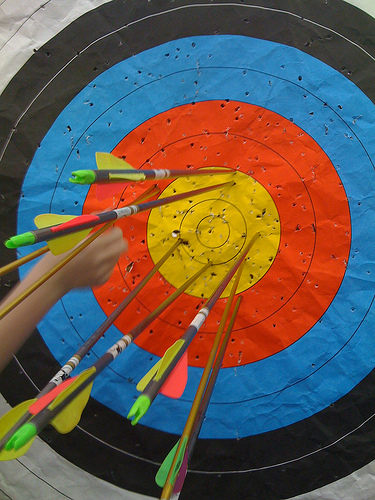FWP:
SETS == TRANSLATABLES
ARCHERY: {6,2}
The commentators are sure that the lover picks up the arrow and returns it to the beloved, begging her to shoot it again; they even supply him with lines of dialogue for the occasion. That scenario works perfectly well, but it's also possible to imagine a more abstract one: fate, destiny, the heavens are against the lover; the arrows of misfortune are raining down on him. And he is such a natural, foreordained target that he not only attracts them but actually invites them-- so much so that if they somehow miss him he goes and helpfully fetches them into his vicinity, where they should by rights have landed.
The real pivot of the verse is the wonderfully versatile
verb ;Thaharnaa . By no accident, all of its three main
senses (see the definition above) work perfectly with the second line. The
sense of 'to stand still' defines the ideal behavior of a target; the sense
of 'to remain' is justified by the act of fetching back, and thus claiming,
the arrows that have missed; the sense of 'to be chosen or determined' is just what the
lover's rhetoric is arguing for.

Nazm:
That is, we have such ardor for the arrow of cruelty/injustice that if it misses, then we ourselves pick it up and give it to the archer, [saying] that, 'Please shoot this arrow again, and don't leave us in a state of not being the target'. (199)
== Nazm page 199